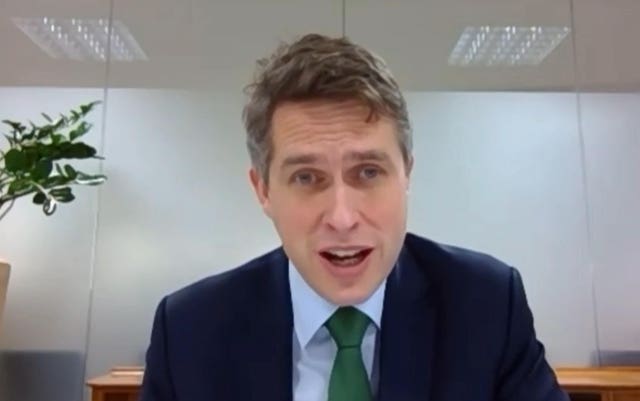Students could sit external papers to inform teacher assessments – Williamson
Teachers should make final judgements on grades ‘as late as possible’ to ensure students remain motivated, the Education Secretary says.

GCSE and A-level students in England could be asked to sit externally-set papers to help teachers with their assessments after exams were cancelled, Education Secretary Gavin Williamson has suggested.
Mr Williamson has set out his expectations for how this summer’s exams will be replaced to ensure students receive fair grades in a letter to England’s exams regulator Ofqual.
Teachers should make a final judgement on a student’s grade “as late as possible” to maximise the remaining teaching time and ensure students remain motivated, the Education Secretary has said.
Last week, Mr Williamson told MPs that he wishes to use a form of teacher-assessed grades to award results after he announced that GCSE, AS and A-level exams were to be cancelled amid the pandemic.

In a letter to Ofqual’s chief regulator Simon Lebus, Mr Williamson has said he would like “to explore the possibility” of using externally set tasks or papers to help teachers with their assessments of students.
The Education Secretary said the Government has agreed not to use an algorithm to set or automatically standardise students’ grades, but he said there should be external checks in place to support fairness and consistency between different institutions and to avoid schools “proposing anomalous grades”.
Last summer, thousands of A-level students had their results downgraded from school estimates by a controversial algorithm, before Ofqual announced a U-turn allowing them to use teachers’ predictions.
Mr Williamson said: “My view is that any changes to grades as a result of the external quality assurance process should be the exception: the process will not involve second-guessing the judgment of teachers but confirming that the process and evidence used to award a grade is reasonable.
“Changes should only be made if those grades cannot be justified, rather than as a result of marginal differences of opinion. Any changes should be based on human decisions, not by an automatic process or algorithm.”
A two-week consultation on the options for exam alternatives is due to be published by Ofqual later this week.
In the letter, Mr Williamson added: “It is my view that a teacher’s final judgment on a student’s grade ought to be as late as possible in the academic year to maximise remaining teaching time and ensure students are motivated to remain engaged in education.”
Mr Lebus said: “We know that the more the evidence comes from students’ performance in externally set papers, the fairer and more consistent teachers’ assessments are likely to be, because all students are given the chance to show what they can do in the same way. Appeal arrangements are also likely to be more straightforward.
“Of course, such an approach will mean teachers have less flexibility in terms of the evidence they could use. The consultation will carefully consider the issues related to this and, given the advantages of students taking consistent papers, whether teachers should be required to use them.
“Like you, we also wish to support and incentivise students to engage with their education for the remainder of the academic year, including to continue with any non-exam assessment where possible.
“We propose that the final determination of a student’s grade should take place as late in the academic year as possible. We believe this will give students a greater sense of agency, which is critical to securing widespread acceptance of the outcomes.”
Mr Williamson’s message to Ofqual confirmed that most written exams for vocational and technical qualifications (VTQ) scheduled for February and March – including Btecs – will not go ahead.
But he said some VTQ assessments should still occur over the coming months when they are needed to “enable a student to demonstrate the proficiency required to enter directly into employment”.
Geoff Barton, general secretary of the Association of School and College Leaders (ASCL), said: “We are relieved to see confirmation that no algorithm will be applied this year following last summer’s grading debacle.
“One of the key issues, however, will be precisely how any system of externally set assessment would work and how this can be done in a way that ensures fairness for students who have been heavily disrupted by the pandemic.
“It is vital that the final plans not only provide fairness and consistency but that they are also workable for schools, colleges and teaching staff who will have to put them into practice.”
Paul Whiteman, general secretary of school leaders’ union NAHT, said: “Although the idea of externally set assessments could be of significant benefit, teachers must be given the flexibility to adapt these to assess students on what they have been taught; a one size test will not fit all.
“Our members are clear that they want to maximise learning time and ensure the learning experience given to all students will help them prepare for their next steps, so the collection of evidence and awarding of grades must not take up all of the teaching time in the summer term.”





